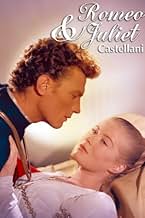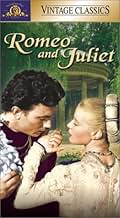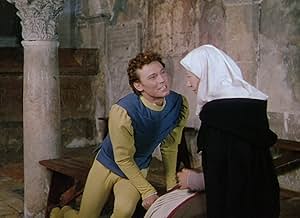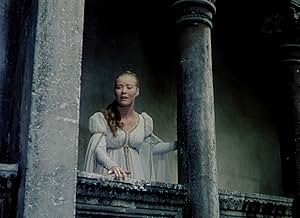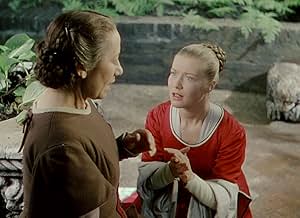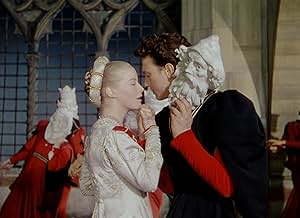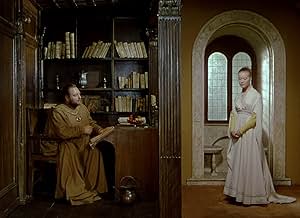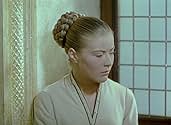IMDb RATING
6.0/10
676
YOUR RATING
In Shakespeare's classic play, the Montagues and Capulets, two families of Renaissance Italy, have hated each other for years, but the son of one family and the daughter of the other fall de... Read allIn Shakespeare's classic play, the Montagues and Capulets, two families of Renaissance Italy, have hated each other for years, but the son of one family and the daughter of the other fall desperately in love and secretly marry.In Shakespeare's classic play, the Montagues and Capulets, two families of Renaissance Italy, have hated each other for years, but the son of one family and the daughter of the other fall desperately in love and secretly marry.
- Director
- Writers
- Stars
- Nominated for 3 BAFTA Awards
- 6 wins & 6 nominations total
Ennio Flaiano
- Prince of Verona
- (as Giovanni Rota)
Thomas Nicholls
- Brother Giovanni
- (as Tom Nicholls)
- Director
- Writers
- All cast & crew
- Production, box office & more at IMDbPro
Featured reviews
Of the several different cinematic adaptations of ROMEO & JULIET that are out there, this version has always been my personal favorite since I first saw it in the early 1970s. The Franco Zefferelli production has that distinction but if you've never seen this one, then you should definitely give it a try now that VCI has given us such a gorgeous looking anamorphic transfer. For years I have had the old MGM VHS tape which I will now gladly donate to the local thrift store where there are still customers who use VHS. There's no need to go into the story since everyone knows that, so I'll focus on what it is about this particular adaptation that I enjoy so much.
First are the locations. The film was shot on location in Verona and other Italian cities in such a way as to resemble Renaissance paintings thanks to the skill of legendary cinematographer Robert Krasker (THE THIRD MAN) who shows here that he can use color the way he used black and white in that classic film. Second is the score by Roman Vlad which is written in the style of music of the period. A galliard which serves as a motif throughout the movie is memorable and effective. Last but not least are the performances. Laurence Harvey, 26 at the time, gives the best line readings of any screen Romeo I have ever heard. Some find his Romeo too effiminate but that will always be a matter of personal opinion. Susan Shentall is not the ideal Juliet but she is more than adequate and her death scene manages to be quite moving. Add character players Flora Robson, Bill Travers, Mervyn Johns and Sebastian Cabot to the mix and their characters spring to life.
Italian director Renato Castellani creates an ideal balance in his movie with a theatrical staging that flows cinematically. The style of dialogue delivery is old school Shakespeare which will seem overly mannered to today's younger ears but you can understand every word and, after all, it is a play. My one complaint is that the English subtitles (handy in Shakespeare) are out of sync after the first 30 minutes appearing a few seconds before the characters speak their lines and then disappearing too quickly. Nevertheless it is great to finally have this R & J on DVD and Blu-Ray where it will now reach a new audience who can see it for themselves and make their own comparisons with other versions. This release is part of a series from VCI of classic Rank Organisation films and about time too!..For more reviews visit The Capsule Critic.
First are the locations. The film was shot on location in Verona and other Italian cities in such a way as to resemble Renaissance paintings thanks to the skill of legendary cinematographer Robert Krasker (THE THIRD MAN) who shows here that he can use color the way he used black and white in that classic film. Second is the score by Roman Vlad which is written in the style of music of the period. A galliard which serves as a motif throughout the movie is memorable and effective. Last but not least are the performances. Laurence Harvey, 26 at the time, gives the best line readings of any screen Romeo I have ever heard. Some find his Romeo too effiminate but that will always be a matter of personal opinion. Susan Shentall is not the ideal Juliet but she is more than adequate and her death scene manages to be quite moving. Add character players Flora Robson, Bill Travers, Mervyn Johns and Sebastian Cabot to the mix and their characters spring to life.
Italian director Renato Castellani creates an ideal balance in his movie with a theatrical staging that flows cinematically. The style of dialogue delivery is old school Shakespeare which will seem overly mannered to today's younger ears but you can understand every word and, after all, it is a play. My one complaint is that the English subtitles (handy in Shakespeare) are out of sync after the first 30 minutes appearing a few seconds before the characters speak their lines and then disappearing too quickly. Nevertheless it is great to finally have this R & J on DVD and Blu-Ray where it will now reach a new audience who can see it for themselves and make their own comparisons with other versions. This release is part of a series from VCI of classic Rank Organisation films and about time too!..For more reviews visit The Capsule Critic.
A friend of mine lent this film to me, because I'm doing research before directing the play. I've now seen about 9 different productions, and while the production is handsome and offers some interesting scenes to try and move the plot along, it features costumes woefully wrong for the period. The interpretation of the text is probably as good as it can be, but huge chunks of dialogue, including the Queen Mab Speech are cut, and Mercutio, always a vivid character, has been reduced to a few lines and an unimportant character. Sebastian Cabot is marvelous as Capulet, and Flora Robson offers some fine moments as the Nurse. Susan Shentall's Juliet is not bad, but except for occasional scenes, Laurence Harvey is phoning it in. I don't completely hate this one -- that would be the Baz Lurhmann disaster, but in comparison, while I've always loved the 1968 Zefferelli version, I'm seeing it from different eyes now, and as I watch the 1936 MGM production, I'm liking the interpretation of the text in that far better than the 1968. This film is an interesting artifact, but it's not especially inspirational. Enjoy it for what it's worth.
Yes, this film has been overpraised by Pauline Kael and others. For its time it was revolutionary, because no previous Shakespeare film had used so many outdoor, realistic locations. Unlike the previous MGM version (which all in all is superior), this version did not use middle-aged actors and made splendid use of technicolor. Black and white cinematography may suit MACBETH, HAMLET, KING LEAR, and other Shakespeare trajedies--but not this one. Since 1954, however, it has been remade in more cinematic and dynamic versions.
Nonetheless, it's a very worthwhile movie, especially for Shakespeare fans. I personally think Laurence Harvey is a terrific Romeo. Yes, he's a bit of a simp, but that's the character. In fact, Harvey is the screen's best Romeo; he's a lot more passionate than Leslie Howard in the MGM version, and he speaks the verse better than either DiCaprio or Leonard Whitting in the two subsequent versions. The locations, better than any version, remind us of just how thin the streets were in Verona during the time of the play, and the high, thick, stone walls serve as a symbol of the intransigence of the families.
Yes, it does have shortcomings, but don't dismiss its virtues, which are many, especially to those of us who want more than the MTV-type Shakespeare that the DiCaprio version offers.
Nonetheless, it's a very worthwhile movie, especially for Shakespeare fans. I personally think Laurence Harvey is a terrific Romeo. Yes, he's a bit of a simp, but that's the character. In fact, Harvey is the screen's best Romeo; he's a lot more passionate than Leslie Howard in the MGM version, and he speaks the verse better than either DiCaprio or Leonard Whitting in the two subsequent versions. The locations, better than any version, remind us of just how thin the streets were in Verona during the time of the play, and the high, thick, stone walls serve as a symbol of the intransigence of the families.
Yes, it does have shortcomings, but don't dismiss its virtues, which are many, especially to those of us who want more than the MTV-type Shakespeare that the DiCaprio version offers.
Even though the colour and the impressive location scenarios work really well here, the rest of it rather falls between two stools. It lacks the intensity of a stage play and the acting talent assembled - Flora Robson and the underused John Gielgud notwithstanding - is really quite underwhelming. You'll recall the story of the feuding Montagues and Capulets that sees true love emerge from centuries of slaughter and mayhem. It's "Romeo" (Laurence Harvey) who falls for "Juliet" (Susan Shentall) and they must keep their burgeoning romance under wraps for fear of all hell breaking loose. That's becoming harder and harder but as the story unfolds it also becomes much less engaging to watch. Harvey never was a particularly versatile actor and there's virtually no chemistry on display between him and the almost as wooden though maybe a bit more suitably virtuous Shentall. It's very much a lacklustre ensemble effort with few of the originally quirky and notable characters standing up to much scrutiny and somehow Renato Castellani has striven to create something here that belies it's credentials as one of literature's greatest and most enduring love stories. At times, it is almost little better than a very well choreographed and photographed soap. Every now and again these re-imaginings of Shakespeare's works come along, but this one is unlikely to be one anyone remembers too fondly.
Renato Castellani's ROMEO AND JULIET has somehow fallen into a hole in film history. Despite a handsome production with some worthy performances, it is overshadowed by Franco Zefferelli's 1966 film and even the 1936 MGM movie with Norma Shearer, Leslie Howard, Basil Rathbone, and John Barrymore. One has to wonder why - it was the first version of the movie to be shot (or partially shot) on locale in Italy in color. While the leads are not the proper juveniles that appeared in the 1966 version, Lawrence Harvey and Susan Shentell were closer to the ages of the characters than Howard and Shearer were.
My guess is that it's very reliance on Italian movie production may have been a drawback to the audiences who (unfortunately) counted the most: English - speaking ones. The leads were all English and the basic play (despite the Italian setting) was in English by the greatest writer of the English language. If it had been filmed in England I suspect it would have had more acceptance. But this is a guess. There could have been other factors: bad timing due to more overpowering productions. Orson Welles' had completed and released OTHELLO in 1952 (where it, like this ROMEO AND JULIET, won a prize at the Venice Film Festival). The following year Lawrence Olivier's masterly RICHARD III was released. The failure of the Castellani movie remains striking and puzzling.
Today Zefferelli's version is considered the best one by most viewers, because of his making his hero and heroine what they are: growing teenagers. But one should not sneer at Harvey's attempts at Romeo opposite Shentell's Juliet. They do generate a soft glow between them that gradually picks up heat. I might add that I found Shentell's final suicide rather stark and complete as it should be. Whether due to her acting or the director's direction she gave Juliet's passing a type of dignity I have rarely seen.
As for the performers in the cast, Sebastian Cabot's Capulet is the picture of an Italian Renaissance merchant prince type, corpulent and ruthless towards his family's foes. It's funny thinking of Cabot today as a villain in his roles, but in fact (prior to his going into CHECKMATE on television - where he was the wise spy master of the heroes) most of his film parts were villainous, or (as in THE TIME MACHINE) ridiculously self-important. His belated affability appeared only when he lucked out and became "Mr. French" in FAMILY AFFAIR. So here, a 1954 audience in the know, would have had no problem about his rattlesnake - eyed timing in planning the demise of Montagues. Look at his scene at the ball he is throwing when Tybalt (Enzo Fiormonte) wants to kill Romeo, but Cabot restrains him - adding that it can be done later.
Also note Mervyn Johns as Friar Lawrence, who manages to show the all-to-human side of the good man, which enables so many bad things to occur because of his trusting the wrong people (one messenger is locked up because he is stuck in a quarantined house), or his instructions were not clear enough. Johns was a gifted actor in his own way. Most people remember him as gentle, loving Bob Crachit opposite crusty, nasty Scrooge (Alistair Sim). But he was also the bedeviled and doomed architect in DEAD OF NIGHT, and the equally doomed partner of the ruthless Spencer Tracy in EDWARD MY SON. Johns was a fine character role player, and was lucky to pass on his skills to his daughter Glynnis.
My guess is that it's very reliance on Italian movie production may have been a drawback to the audiences who (unfortunately) counted the most: English - speaking ones. The leads were all English and the basic play (despite the Italian setting) was in English by the greatest writer of the English language. If it had been filmed in England I suspect it would have had more acceptance. But this is a guess. There could have been other factors: bad timing due to more overpowering productions. Orson Welles' had completed and released OTHELLO in 1952 (where it, like this ROMEO AND JULIET, won a prize at the Venice Film Festival). The following year Lawrence Olivier's masterly RICHARD III was released. The failure of the Castellani movie remains striking and puzzling.
Today Zefferelli's version is considered the best one by most viewers, because of his making his hero and heroine what they are: growing teenagers. But one should not sneer at Harvey's attempts at Romeo opposite Shentell's Juliet. They do generate a soft glow between them that gradually picks up heat. I might add that I found Shentell's final suicide rather stark and complete as it should be. Whether due to her acting or the director's direction she gave Juliet's passing a type of dignity I have rarely seen.
As for the performers in the cast, Sebastian Cabot's Capulet is the picture of an Italian Renaissance merchant prince type, corpulent and ruthless towards his family's foes. It's funny thinking of Cabot today as a villain in his roles, but in fact (prior to his going into CHECKMATE on television - where he was the wise spy master of the heroes) most of his film parts were villainous, or (as in THE TIME MACHINE) ridiculously self-important. His belated affability appeared only when he lucked out and became "Mr. French" in FAMILY AFFAIR. So here, a 1954 audience in the know, would have had no problem about his rattlesnake - eyed timing in planning the demise of Montagues. Look at his scene at the ball he is throwing when Tybalt (Enzo Fiormonte) wants to kill Romeo, but Cabot restrains him - adding that it can be done later.
Also note Mervyn Johns as Friar Lawrence, who manages to show the all-to-human side of the good man, which enables so many bad things to occur because of his trusting the wrong people (one messenger is locked up because he is stuck in a quarantined house), or his instructions were not clear enough. Johns was a gifted actor in his own way. Most people remember him as gentle, loving Bob Crachit opposite crusty, nasty Scrooge (Alistair Sim). But he was also the bedeviled and doomed architect in DEAD OF NIGHT, and the equally doomed partner of the ruthless Spencer Tracy in EDWARD MY SON. Johns was a fine character role player, and was lucky to pass on his skills to his daughter Glynnis.
Did you know
- TriviaDame Joan Collins was originally slated to play Juliet, but turned it down when Writer and Director Renato Castellani insisted she undergo surgery to change the shape of her nose.
- ConnectionsReferenced in Arena: All the World's a Screen - Shakespeare on Film (2016)
- How long is Romeo and Juliet?Powered by Alexa
Details
- Release date
- Countries of origin
- Official site
- Languages
- Also known as
- Romeo and Juliet
- Filming locations
- Italy(made in Italy)
- Production companies
- See more company credits at IMDbPro
- Runtime2 hours 21 minutes
Contribute to this page
Suggest an edit or add missing content


